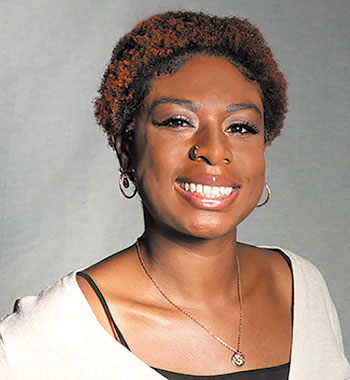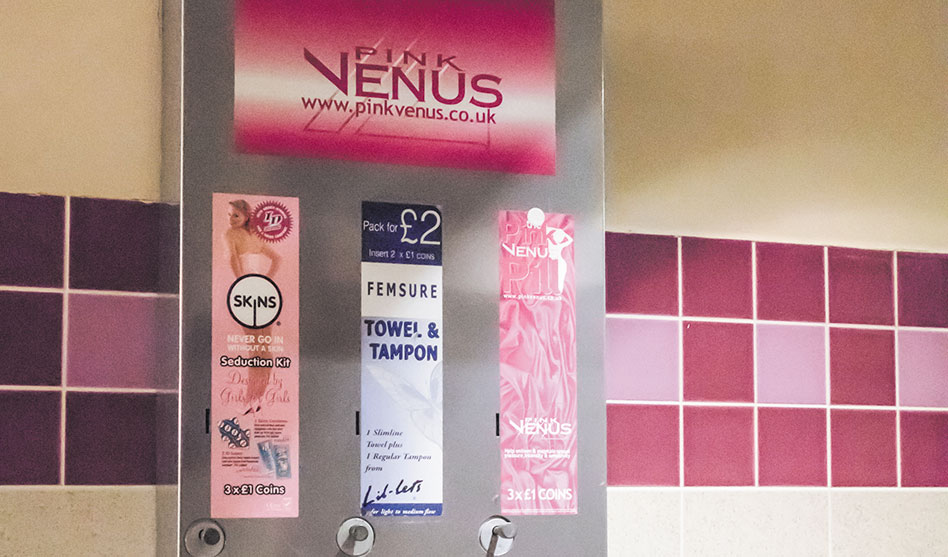For LGBTQ+ Dallasites, period products are often out of reach
SYDNI WALKER | Special Contributor
skwalker@mail.smu.edu
Am I going to buy groceries this week or pads? This was the question that Ash Thye, a Southern Methodist University graduate and menstrual equity advocate, asked himself when he was “broke broke” in high school. He almost always chose food, he said, since he would rather eat.
“Because I was dirt poor, I was making pads out of toilet paper,” Thye said. “That’s the point I was at, and so I was using toilet paper for several years off and on.
“But for me, when I came out as trans in high school, that also put me in a position where it was less safe for me to ask an acquaintance for a pad, because it involved a lot more explaining myself.”
Ash’s situation is, unfortunately, not unique. Whether it’s due to unpreparedness, fear for one’s safety or for financial reasons, menstruators of all ages lacking access to the appropriate products during a period is not only embarrassing but can cause both educational and career setbacks.
And for members of the LGBTQ community, particularly those who are not cisgender, the negative effects are intensified.
The city of Dallas is working to ensure that period poverty is a thing of the past — in the Dallas Independent School District and beyond. Period Access Dallas, also known as P.A.D., works to provide access to free period products throughout the city. The initiative launched in May 2022 across 24 Dallas public facilities and has now expanded to about 70, including parks and recreation centers, public libraries and community centers. The program provides pads and tampons in dispensers in the men’s, women’s and family bathrooms, as well as a one month’s supply available upon request, which can even be provided in a shopping bag to avoid unwanted questioning.
The Dallas school district introduced a similar program after members of Skyline High School’s IGNITE organization identified how the lack of access to period products disrupted their learning, caused embarrassment and oftentimes led to them leaving school entirely. The group presented a proposed plan to their facilitator, who then brought the idea to the board of trustees and chief operations officer.

Sidney Yerger
Thanks to these students, period product dispensers are available in all Dallas school district high schools and soon will be available in all middle schools.
Period poverty is a real issue — for all ages. The highest amount of requests for period products came from the 11-to-17-year-old age group, according to data from a P.A.D. update in October 2022. More than 8,000 packages of products have been distributed since P.A.D.’s introduction, according to the city of Dallas.
On any given day, an estimated 500 million individuals lack access to menstrual products and adequate facilities for menstrual hygiene management, according to The World Bank.
The high prices of period products can hit even harder for transgender people. Twenty-nine percent of respondents in the 2015 U.S. Transgender Survey reported living in poverty, compared to just 12 percent of the U.S. population overall. This definitely hits home in Dallas, which is home to the largest number of LGBTQ people in Texas — more than 200,000 to be exact — and the sixth-largest in the United States, according to Visit Dallas.
Both P.A.D. and the Dallas school district’s program have gotten positive responses. Michael Peeples, the city of Dallas’ community services manager and overseer of P.A.D., said they never thought they would see something like this happen in their lifetime. The Dallas school district program has even inspired other school districts, said Karla Guadalupe García, a former District 4 school board trustee.
“I was able to talk to students from Fort Worth ISD who heard about the effects of this idea in Dallas ISD and brought it to the Fort Worth school board,” García said.
“Ultimately I’m happy to share that Fort Worth has done the same thing.”
Conversations around hygiene products and menstrual health are incredibly important, but including menstruators who don’t identify as women is also crucial, noted Nathan Faust, the director of the Women & LGBT Center at SMU.
“A lot of people don’t think of it really in this way. So it’s about shifting the conversation… . It’s not just for blanket statements saying, oh, women’s health products, or women’s reproductive products, because not everyone who uses those products is a woman or identifies as women,” Faust said.
“So how do we make sure that those students or those people, staff members, faculty, anyone, community members have access to those while they’re on [SMU’s] campus?”
At SMU, free period products are available in the Hughes-Trigg Student Center, thanks to The Period Project at SMU, a student-run group that advocates for access to the products on campus. The products, however, are only in the building’s women’s restrooms, and the dispensers have not been restocked.
For those who are not comfortable entering the women’s restrooms, the Women & LGBT Center has a shelf full of products where students can walk in, grab what they need and leave. The hope is to expand this access to other restrooms on campus, Faust said.
For LGBTQ identifying Dallasites, Dallas Hope Charities provides not only free menstrual products but safe housing as well. The program initially began in 2016 as a program of Cathedral of Hope UCC but eventually split off into its own nonprofit and program in 2018 after a young LGBTQ-identifying Dallasite came to the program searching for housing and eventually died by suicide in the time it took to find them housing.
Since then, the program has focused on housing, basic needs and community education for LGBTQ young adults (ages 18-24, specifically) experiencing homelessness, said Sidney Yerger, Dallas Hope Charities outreach and education engagement manager.
While the nonprofit focuses mainly on housing, it offers hygiene products regardless of gender identity. They are, however, donations-based, meaning accessibility is affected by the amount and quality of the products received. Some donations to Dallas Hope Charities are gender binary, like masculine and feminine gift bags, which exclude certain menstruators. On top of a lack of products, a lack of staff also limits the group, as they are unable to go out and physically connect with the community to learn their needs.
“Unfortunately, it’s only four of us,” Yerger said. “So we can’t do that [conduct outreach] as often as we’d like to. We are donations-based, so we don’t even always have [menstrual] products on hand. So it’s really just kind of those limitations.”
The city of Dallas’ P.A.D. program, which includes product dispensers in all three bathrooms, has faced controversy for its inclusivity of all gender identities. In some locations, negative responses have led the program to leave signage in the men’s restrooms but remove the products to avoid a loss of inventory. Public facility visitors who have encountered dispensers in the men’s restroom have brought products up to the front desk, thrown them in the garbage, and even escalated their grievances to the city manager’s office, Peeples said.
“Not only does it affect those individuals from the LGBT community, but also parents. You know, fathers that visit the restroom that may have children menstruating, and they, too, then lose that resource as an option,” Peeples said.
While the Dallas school district provides products in all of their high schools, the dispensers are only included in women’s restrooms, with additional products located in the nurse’s clinic. This leaves LGBTQ students out of luck. Fifty-eight percent of transgender youth don’t feel safe using the restroom or locker room that best reflects their gender, according to the Human Rights Council 2018 LGBTQ youth report. This dilemma is all too familiar to Thye.
“The only single-stall restroom that was available was the nurse’s office, which meant walking,” Thye said. “I literally timed it in high school out of spite — 14 minutes to the bathroom on the other side of campus, and back through like eight hallways, several doors, checking in at our front desk, just to say I have to go pee, and then walking 14 minutes back.
“That’s a lot of time if you think about it when you have a 50-minute high school class,” they continued. “Because that was such an incredible inconvenience…I ended up taking the less-safe option of using the men’s and women’s restrooms — putting myself through that level of getting screamed at and people throwing hands at me; those were the lengths I was willing to go to because it was so much easier still than going to the nurse’s bathroom.”
Now working in arts education in New York City, Thye was able to ensure access to free period products at the kids’ studio where he works. This is just one example of the “day-to-day ways” people can continue to fight for LGBTQ rights and menstrual equity, Thye said.
Both the P.A.D. and the Dallas school district menstrual equity programs are in their early stages. The Dallas school district is just now expanding to middle schools, with elementary schools next on the list. Dallas’ P.A.D. initiative is only in phase 2, but the city hopes to collaborate with outside organizations, inspire other cities to adopt the cause, and continue to ensure gender equity, said Peeples. There is still time for growth; LGBTQ people cannot be cast aside when working to achieve menstrual equity, Thye said.
“The only goals, in my opinion, that matter, are the ones that bring everyone along,” Thye said.

